英语人教新课标必修五 Unit 3 Life in the future情态动词课件(15张ppt)
文档属性
| 名称 | 英语人教新课标必修五 Unit 3 Life in the future情态动词课件(15张ppt) |
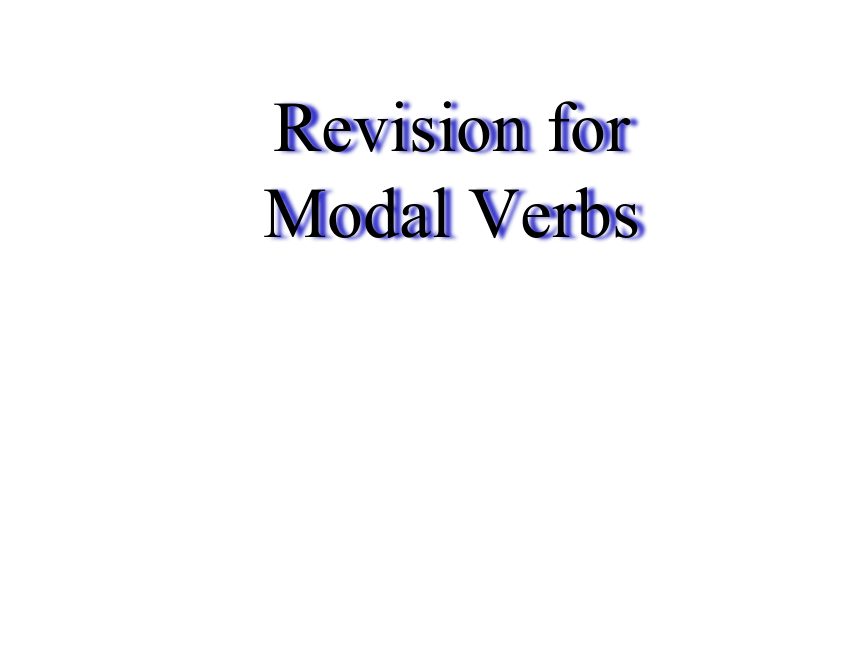
|
|
| 格式 | zip | ||
| 文件大小 | 375.6KB | ||
| 资源类型 | 教案 | ||
| 版本资源 | 人教版(新课程标准) | ||
| 科目 | 英语 | ||
| 更新时间 | 2022-02-19 15:14:31 | ||
图片预览

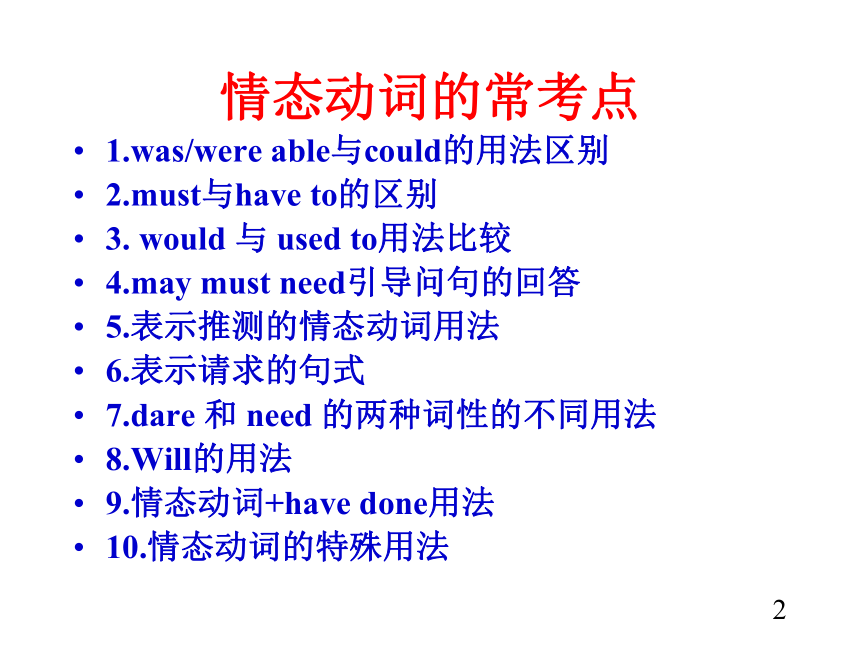
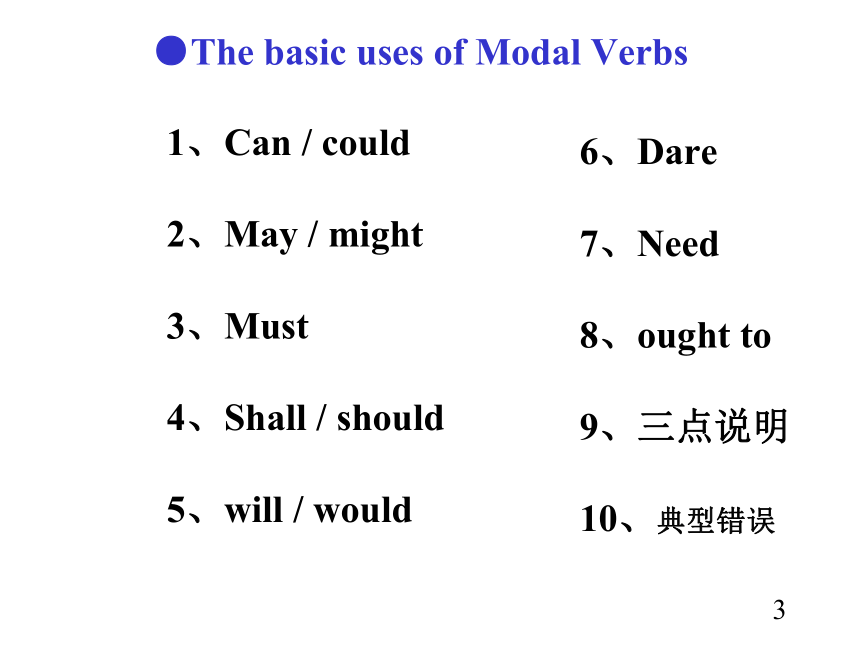
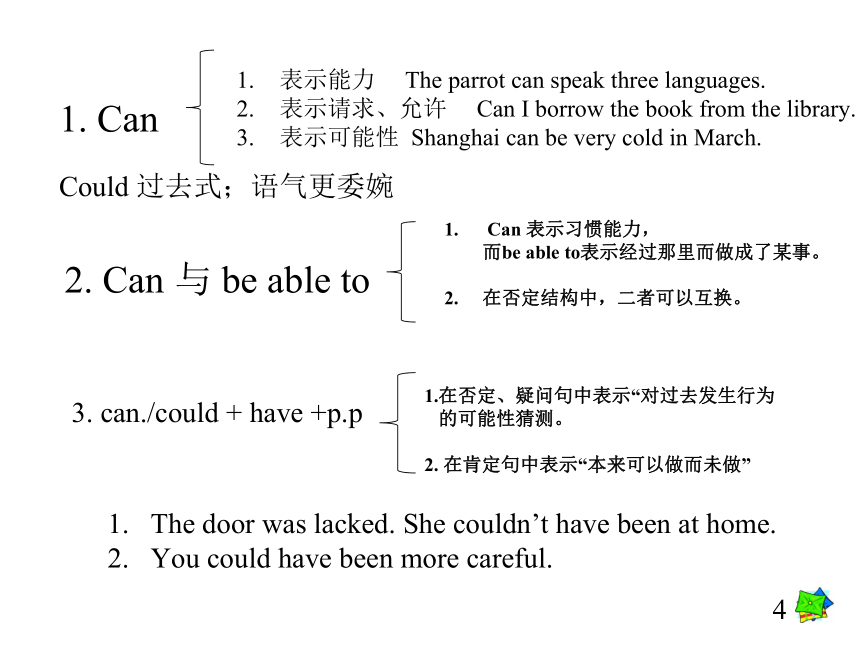
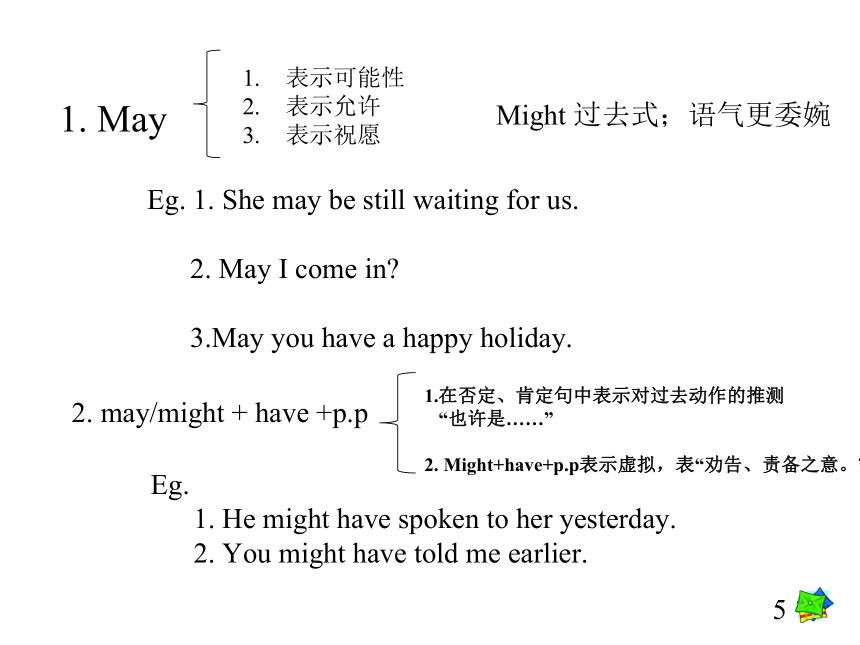

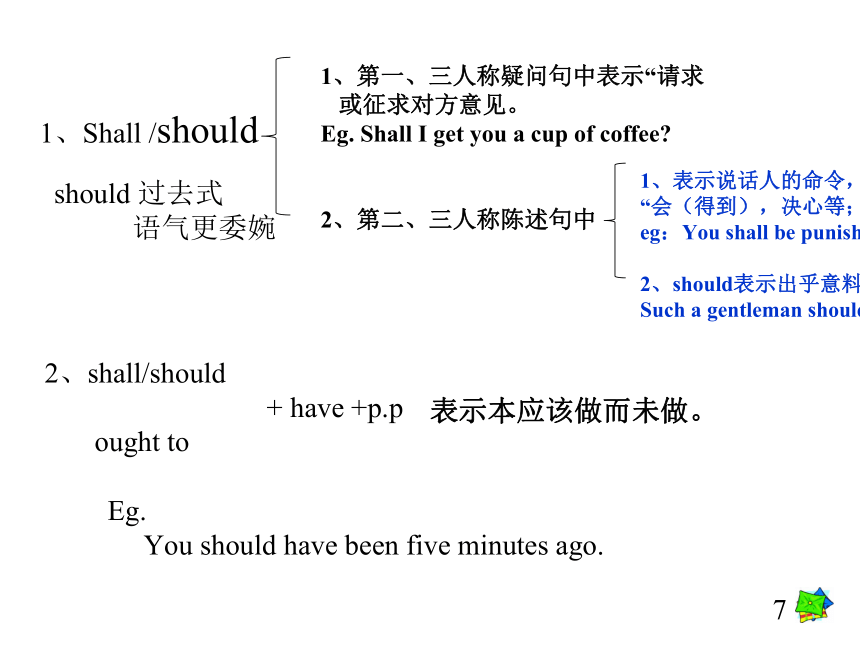
文档简介
(共15张PPT)
Revision for
Modal Verbs
2
情态动词的常考点
1.was/were able与could的用法区别
2.must与have to的区别
3. would 与 used to用法比较
4.may must need引导问句的回答
5.表示推测的情态动词用法
6.表示请求的句式
7.dare 和 need 的两种词性的不同用法
8.Will的用法
9.情态动词+have done用法
10.情态动词的特殊用法
3
●The basic uses of Modal Verbs
6、Dare
7、Need
8、ought to
9、三点说明
10、典型错误
1、Can / could
2、May / might
3、Must
4、Shall / should
5、will / would
4
1. Can
表示能力 The parrot can speak three languages.
表示请求、允许 Can I borrow the book from the library.
表示可能性 Shanghai can be very cold in March.
Could 过去式;语气更委婉
2. Can 与 be able to
Can 表示习惯能力,
而be able to表示经过那里而做成了某事。
2. 在否定结构中,二者可以互换。
3. can./could + have +p.p
1.在否定、疑问句中表示“对过去发生行为
的可能性猜测。
2. 在肯定句中表示“本来可以做而未做”
The door was lacked. She couldn’t have been at home.
You could have been more careful.
5
1. May
表示可能性
表示允许
表示祝愿
Might 过去式;语气更委婉
2. may/might + have +p.p
1.在否定、肯定句中表示对过去动作的推测
“也许是……”
2. Might+have+p.p表示虚拟,表“劝告、责备之意。”
Eg. 1. She may be still waiting for us.
2. May I come in
3.May you have a happy holiday.
Eg.
1. He might have spoken to her yesterday.
2. You might have told me earlier.
6
1. Must
表示肯定的猜测,但只用于肯定句,
而mustn’t 表示“禁止、不准”
eg:the car is my property;you musn't use it without my permission.
3.“偏要,非要…不可”
eg: If you must go,at least wait until the storm is over.
4.表示必须、应该
2. Must 、have to
与have got to
Must表示主观
Have to表示客观需求
Have got to 多见于口语
3. must + have +p.p
对过去事情的肯定猜测。
Eg. The road is wet. It must have rained last night.
7
1、Shall /should
1、第一、三人称疑问句中表示“请求
或征求对方意见。
Eg. Shall I get you a cup of coffee
2、第二、三人称陈述句中
1、表示说话人的命令,警告、威胁、允诺
“会(得到),决心等;用于条约,规定,法令等。
eg:You shall be punished for what you have done.
2、should表示出乎意料的口气,意为竟然,居然
Such a gentleman should do that.
2、shall/should
+ have +p.p
ought to
表示本应该做而未做。
should 过去式
语气更委婉
Eg.
You should have been five minutes ago.
8
Will/ would
1、表示意愿
I’ll try my best to overcome the difficulty.
2、表示意图
What will you do
3、表示请示、请求,建议
Will you help me to put these books in order
4、表示习惯动作
She will sit for hours without saying a word.
Would 与 used to
1、Would 后只能接表示动作的动词。
2、used to 则还可以接表示状态的动词。
Eg.
He used to be a worker.
9
1、情态动词用于否定、疑问句;条件从句中。
eg.
1. Dare you go here alone
2. How dare you do such follish things
3. I won’t allow you to swim in the river,
even if you dare do it.
I dare say 我想,大概
Dare / dared
2 、做实意动词后加不定式。
eg.
I have never dared to tell him about it.
10
Need /needed
1、情态动词用于否定句,疑问句。
2、实意动词用法似dare,用作不定式。
3、need + not + have +p.p
表示“本来不需要做而做了。
11
Ought to
1、其否定式为ought not to
2、ought to + have + p.p
表示本来应该做而没有做到。
Eg.
You ought not to have cut away the trees around the old building.
3.表示义务,意为“应当”,语气比should 强,表示不十分或含蓄地推测,
意为“应是,应该”
Eg :You ought to work harder than before.
12
三点说明
1、情态动词 + v 表示对现在或将来动作的猜测。
情态动词 + have + p.p表示对过去动作的猜测。
2、情态动词的过去式与原形相比,多点礼貌,少点冒昧,
语气更为委婉。
情态动词在一般疑问句中的回答:
① Can you sing
② May I come in
③ Must I handin the book now
④ Need I finish it now
Yes, I can.
No, I can’t.
Yes, you may.
No, you mustn’t.
Yes, you must.
No, needn’t /don’t have to.
Yes, you must.
No, you needn’t.
13
典型错误
1. He mustn’t be in the classroom. ( )
Can’t
2. You might leave the bag on the bag. ( )
might have left
3. You must have seen the film last week, have’t you
( )
didn’t you
4. Li ming must have been to Japan, didn’t he ( )
hasn’t he
14
情态动词的特殊用法
1.May (表祝愿) 2.must (偏偏) 3.should (竟然) 4.can (有时会,客观可能性) 5.may/might as well do sth(不妨,还是…好)
6.Can not (can never)…too (over)(无论…也不过分,决不会…的)
15
Revision for
Modal Verbs
2
情态动词的常考点
1.was/were able与could的用法区别
2.must与have to的区别
3. would 与 used to用法比较
4.may must need引导问句的回答
5.表示推测的情态动词用法
6.表示请求的句式
7.dare 和 need 的两种词性的不同用法
8.Will的用法
9.情态动词+have done用法
10.情态动词的特殊用法
3
●The basic uses of Modal Verbs
6、Dare
7、Need
8、ought to
9、三点说明
10、典型错误
1、Can / could
2、May / might
3、Must
4、Shall / should
5、will / would
4
1. Can
表示能力 The parrot can speak three languages.
表示请求、允许 Can I borrow the book from the library.
表示可能性 Shanghai can be very cold in March.
Could 过去式;语气更委婉
2. Can 与 be able to
Can 表示习惯能力,
而be able to表示经过那里而做成了某事。
2. 在否定结构中,二者可以互换。
3. can./could + have +p.p
1.在否定、疑问句中表示“对过去发生行为
的可能性猜测。
2. 在肯定句中表示“本来可以做而未做”
The door was lacked. She couldn’t have been at home.
You could have been more careful.
5
1. May
表示可能性
表示允许
表示祝愿
Might 过去式;语气更委婉
2. may/might + have +p.p
1.在否定、肯定句中表示对过去动作的推测
“也许是……”
2. Might+have+p.p表示虚拟,表“劝告、责备之意。”
Eg. 1. She may be still waiting for us.
2. May I come in
3.May you have a happy holiday.
Eg.
1. He might have spoken to her yesterday.
2. You might have told me earlier.
6
1. Must
表示肯定的猜测,但只用于肯定句,
而mustn’t 表示“禁止、不准”
eg:the car is my property;you musn't use it without my permission.
3.“偏要,非要…不可”
eg: If you must go,at least wait until the storm is over.
4.表示必须、应该
2. Must 、have to
与have got to
Must表示主观
Have to表示客观需求
Have got to 多见于口语
3. must + have +p.p
对过去事情的肯定猜测。
Eg. The road is wet. It must have rained last night.
7
1、Shall /should
1、第一、三人称疑问句中表示“请求
或征求对方意见。
Eg. Shall I get you a cup of coffee
2、第二、三人称陈述句中
1、表示说话人的命令,警告、威胁、允诺
“会(得到),决心等;用于条约,规定,法令等。
eg:You shall be punished for what you have done.
2、should表示出乎意料的口气,意为竟然,居然
Such a gentleman should do that.
2、shall/should
+ have +p.p
ought to
表示本应该做而未做。
should 过去式
语气更委婉
Eg.
You should have been five minutes ago.
8
Will/ would
1、表示意愿
I’ll try my best to overcome the difficulty.
2、表示意图
What will you do
3、表示请示、请求,建议
Will you help me to put these books in order
4、表示习惯动作
She will sit for hours without saying a word.
Would 与 used to
1、Would 后只能接表示动作的动词。
2、used to 则还可以接表示状态的动词。
Eg.
He used to be a worker.
9
1、情态动词用于否定、疑问句;条件从句中。
eg.
1. Dare you go here alone
2. How dare you do such follish things
3. I won’t allow you to swim in the river,
even if you dare do it.
I dare say 我想,大概
Dare / dared
2 、做实意动词后加不定式。
eg.
I have never dared to tell him about it.
10
Need /needed
1、情态动词用于否定句,疑问句。
2、实意动词用法似dare,用作不定式。
3、need + not + have +p.p
表示“本来不需要做而做了。
11
Ought to
1、其否定式为ought not to
2、ought to + have + p.p
表示本来应该做而没有做到。
Eg.
You ought not to have cut away the trees around the old building.
3.表示义务,意为“应当”,语气比should 强,表示不十分或含蓄地推测,
意为“应是,应该”
Eg :You ought to work harder than before.
12
三点说明
1、情态动词 + v 表示对现在或将来动作的猜测。
情态动词 + have + p.p表示对过去动作的猜测。
2、情态动词的过去式与原形相比,多点礼貌,少点冒昧,
语气更为委婉。
情态动词在一般疑问句中的回答:
① Can you sing
② May I come in
③ Must I handin the book now
④ Need I finish it now
Yes, I can.
No, I can’t.
Yes, you may.
No, you mustn’t.
Yes, you must.
No, needn’t /don’t have to.
Yes, you must.
No, you needn’t.
13
典型错误
1. He mustn’t be in the classroom. ( )
Can’t
2. You might leave the bag on the bag. ( )
might have left
3. You must have seen the film last week, have’t you
( )
didn’t you
4. Li ming must have been to Japan, didn’t he ( )
hasn’t he
14
情态动词的特殊用法
1.May (表祝愿) 2.must (偏偏) 3.should (竟然) 4.can (有时会,客观可能性) 5.may/might as well do sth(不妨,还是…好)
6.Can not (can never)…too (over)(无论…也不过分,决不会…的)
15
